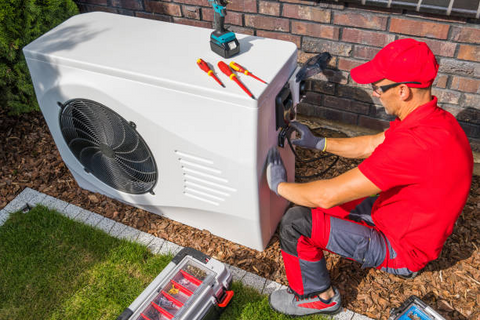Heat pumps are gaining popularity as an energy-efficient alternative to traditional heating systems, offering both heating and cooling capabilities. They are renowned for operating efficiently, resulting in reduced energy consumption. For example, an air-source heat pump can provide 1.5 to 3 times more heat energy to your home than the electrical energy it consumes. Not only do they save on energy costs, but they also appeal to homeowners seeking efficient solutions.

Nevertheless, heat pump systems are not immune to wear and tear over time like any mechanical system. If you've recently invested in a heat pump and are encountering issues, fret not. In this guide, we'll provide valuable insights on maintaining and troubleshooting your heat pump, ensuring your heating and cooling system runs smoothly.
Routine Maintenance for Optimal Performance
Like any complex machinery, heat pumps demand regular attention to maintain their efficiency. Start with simple tasks like cleaning or changing air filters every few months, allowing proper airflow and preventing strain on the system. Additionally, inspect outdoor coils for debris and clean them as necessary. Professional annual maintenance, performed by certified technicians, ensures thorough checks of refrigerant levels, electrical connections, and overall system functionality.
Preserving Outdoor Units
The outdoor unit, often exposed to the elements, requires extra care. Regularly clear away debris, leaves, and vegetation to prevent airflow blockage. Check for signs of damage or wear and trim vegetation to maintain a clear perimeter around the unit. This ensures unrestricted airflow and allows the heat pump to operate efficiently.
Troubleshooting Common Issues
Understanding potential problems can empower you to troubleshoot before they escalate. Common issues include insufficient heating or cooling, irregular airflow, and unusual noises. While some concerns may require professional attention, others might have straightforward solutions, like adjusting the thermostat settings, checking for blown fuses, or ensuring the circuit breaker is operational.
Addressing Refrigerant Leaks
Refrigerant leaks can severely hamper heat pump performance. If you notice a decrease in heating or cooling efficiency, frost on outdoor components, or hissing sounds, it's crucial to address potential refrigerant leaks promptly. Contact a professional technician to diagnose and rectify the issue, as refrigerant handling requires specialized expertise.
Ensuring Optimal Airflow
Proper airflow is essential for efficient heat pump operation. Regularly check and clean air vents, registers, and ducts to prevent obstructions. Blocked airflow forces the system to work harder, leading to increased energy consumption and potential damage over time.
Examining Thermostat Functionality
Thermostat issues can mimic heat pump malfunctions. If you experience temperature inconsistencies, it's wise to examine thermostat settings, replace batteries if necessary, and ensure proper calibration. A faulty thermostat can cause the system to overwork or underperform.
Embracing Seasonal Adjustments
Heat pump performance varies with the seasons. In winter, ensure outdoor coils are free from ice and snow accumulation, allowing proper operation. Conversely, in summer, keep the outdoor unit clear of debris to optimize cooling efficiency.
Professional Expertise in Complex Issues
While some maintenance tasks are suitable for DIY enthusiasts, certain issues necessitate professional intervention. Complex electrical problems, refrigerant-related concerns, and intricate mechanical repairs should be entrusted to certified technicians. Investing in professional service safeguards your heat pump's longevity and your home's comfort.
Conclusion
Maintaining and troubleshooting your heat pump is a blend of responsible upkeep and timely intervention. By adhering to routine maintenance practices and swiftly addressing emerging issues, you not only enhance your heat pump's performance but also enjoy uninterrupted comfort throughout the seasons.

